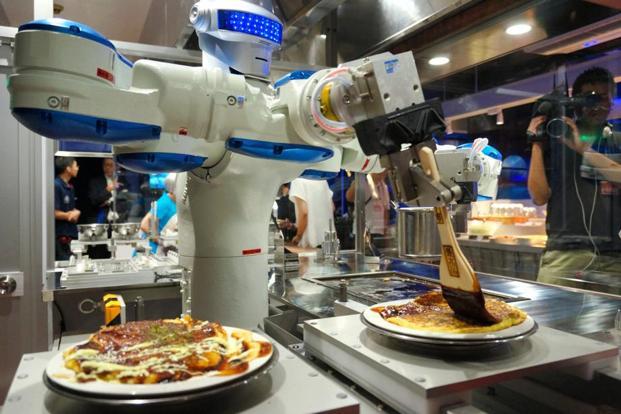(单词翻译:单击)
听力文本
JUDY WOODRUFF: Some questions: Will robots take our jobs or work alongside us? Are we doing enough to educate the next generation of workers? How soon will technology radically change the work force? These are just some of the questions we will be exploring next week in a series called The Future of Work. Tonight, economics correspondent Paul Solman starts us off by putting a few of those concerns into perspective. It's part of our weekly series Making Sense.
PAUL SOLMAN: First, the job scare story you have likely heard: millions of humans replaced by robots, 75 million of them within five years, says the World Economic Forum. But it then adds, 133 million new jobs may be created at the same time. That's what's called creative destruction. Here's Carl Frey of Oxford University:
CARL BENEDIKT FREY, Oxford University: This has, theme has been recurring from time to time for the past 200 years. If you go back to the Roman Empire, there were people expressing concerns over technological unemployment as well.
PAUL SOLMAN: Why? Well, for one thing, losing a job really hurts. Roman Emperor Vespasian built the Coliseum without the help of labor-saving technology to move heavy columns because it would displace manual labor, threaten civil unrest. Remember the Luddites, who broke the high-tech textile looms of the early 1800s to save their jobs, and were hanged for their efforts? The Washington Post employees who sabotaged automated presses in 1975? And it's not hard to understand why workers are so resistant to creative destruction. Here's MIT's Andrew McAfee:
ANDREW MCAFEE, Massachusetts Institute of Technology: Change is scary. We humans have a bias for the status quo. We don't want the boat rocked really hard. And it's always easier to focus on the destruction part than the creation part, for a lot of obvious reasons. It's easy to see this job being automated away. It's not as immediately clear what kinds of jobs, what kinds of opportunities are being created by technology.

PAUL SOLMAN: Study after study has found significant physical and mental health effects of even one layoff, even when the person found another job. And Oxford's Carl Frey has estimated that almost half of U.S. jobs are at risk of elimination.
CARL BENEDIKT FREY: If economic history provides guidance, it suggests that we will continue to create a lot of new jobs as well. But, even if we do, there's no assurance that the people that lose out to automation in the short run are going to be the ones employed in the new jobs that emerge in the long run.
PAUL SOLMAN: Another problem with creative destruction, technological progress, automation, robots, they all threaten to amplify inequality, creating more high-paying jobs, possibly more low-paying jobs, but not nearly enough in between.
ANDREW MCAFEE: We see technology creating really good jobs, very high-paying jobs, really great careers. User interface designer is a great job, data scientist, machine learning specialist, product manager at a high-tech company. These are really, really good jobs, upper-middle-class and above kinds of jobs. There's also a huge bulge of jobs being created down at the low end of the pay scale. And these are typically in-person jobs. They're typically service jobs. So, we are not creating this big group of great middle-class jobs.
PAUL SOLMAN: There's at least one more question worth exploring about the future of work: How fast are things going to change? Are the robots and driverless trucks just around the corner, or still miles and miles down the road? Again, MIT's McAfee.
ANDREW MCAFEE: Lots of technology changes are going to happen quicker than we think. And I say that for two main reasons. The first one is that all the elements, all the building blocks of really powerful technology platforms and companies, all those building blocks are improving super quickly. They got networks, processors, storage, bandwidth. And innovators and entrepreneurs are combining those building blocks in really interesting ways, and they're doing it faster and cheaper than ever before.
PAUL SOLMAN: And so these are the questions we will explore in next week's Future of Work series. Can a small Kentucky community that once relied on jobs of the past be transformed into a hub of jobs of the future? Will technology and automation hurt minority populations the most? Are robots going to take our jobs, or will robot helpers, cobots, wind up working alongside us? Are truck drivers toast? And, if so, in what time frame? Finally, how much demand will there be for the humanities in a high-tech economy? We will try to answer those questions next week. For now, I'm economics correspondent Paul Solman.
JUDY WOODRUFF: So, don't miss our entire series The Future of Work. That's next Monday through Friday on the PBS NewsHour.
重点解析
1.in the short run 短期
In fact, things could get worse in the short run.
事实上,事情在短期内可能会变得更加糟糕。
2.not nearly enough 远远很不够
He had 20 dollars, but that was not nearly enough for the trip.
他有二十元,但这远远不够旅途费用。
3.at risk of 有危险的
A suppressed immune system puts a transplant recipient at risk of other infections.
接受器官移植的病人免疫系统受到抑制后很可能会感染其他疾病。
4.manual labor 体力劳动
Having grown up in the countryside, I'm used to manual labor.
我生长在农村,习惯体力劳动了。
5.wind up 结束
The President is about to wind up his visit to Somalia
总统即将结束对索马里的访问。
参考译文
朱迪·伍德拉夫:本期节目,我们来讨论一些问题——机器人会抢走我们的工作吗?关于教育下一代工人,我们做的是否足够多呢?科技还要多久就能彻底变革劳动力了?上述问题只是我们本周探讨的其中几个问题,更详细的会在我们的集锦《未来的工作》中播出。今晚,经济学记者保罗·索尔曼将首先带我们来了解几个这方面的忧虑。欢迎来到周更的系列节目《寻找意义》。
保罗·索尔曼:先来说一个大家耳熟能详的职场恐怖故事:无数人类被机器人取代,大概5年内会有7500万人被取代,这是世界经济论坛上的结论。不过工作岗位也会随着增加,与此同时可能会有1.33亿新的工作岗位诞生。这就是我们所说的创造性破坏。下面请听卡尔·弗雷从牛津大学发回的报道。
卡尔·贝内迪克特·弗雷,牛津大学:这个话题是过去200年间人们时常讨论的话题。回看罗马帝国时代,那时候也有人担心技术性失业。
保罗·索尔曼:为什么呢?这是因为,一方面,失业真地很伤人。罗马皇帝维斯帕先建造斗兽场的时候,没有借助节省劳力的科技手段来搬动沉重的柱子,因为这样会替代人工劳动力,引起社会动乱。还记得卢德分子吗?他们砸坏了19世纪初期的高科技纺织机,目的是保住自己的饭碗,最后因此被绞刑。还记得1975年《华盛顿邮报》的员工怠工以抗议自动化媒体吗?也不难理解工人们为何对创造性破坏如此抵抗。接下来请听麻省理工安德鲁·麦卡菲的解释:
安德鲁·麦卡菲,麻省理工:改变是很可怕的。我们人类对现状总是存有偏见。我们不希望船晃动地太厉害。而专注于破坏的部分要比专注于创造的部分更容易,这其中有很多明显的原因。很容易看到某个工作变成了自动化。而科技创造出的工作岗位和机会却没有那么明显。
保罗·索尔曼:一次又一次的研究发现哪怕是一次解雇也会引起重大的身体和心理健康后果,就算失业者之后再次找到工作,重创也是极大的。牛津大学的卡尔·弗雷估计,美国近半数的工作岗位都有消失的风险。
卡尔·贝内迪克特·弗雷:如果经济学的历史能提供一些指导,那么我们还是会继续创造新的工作岗位。但即便如此,也没有人能保证当初因为自动化而在短期内失业的人群是否会在长期浮现的新工作岗位里胜任。
保罗·索尔曼:创造性破坏、技术进步、自动化、机器人的出现还存在一个问题——他们都可能会将不平等放大,创造出更多高薪的工作和更多低薪的工作,而完全没有中间地带。
安德鲁·麦卡菲:我们可以看到科技创造出了很多很好的工作岗位,都是很高薪、很棒的岗位。用户界面(UI)设计师是很好的工作,此外还有数据科学家、机器学习专家、高科技公司的产品经理。这些都是好工作,是上中产阶级的工作。此外,也有大量低薪的工作出现。这些工作都是要面对面才能做的,都是典型的服务类工作。所以,不会产生庞大而又让人满意的中产阶级工作。
保罗·索尔曼:关于未来的工作,还有一个问题值得讨论:变革的速度会有多快?机器人和无人驾驶的卡车是即将到来,还是还有很久?关于这个问题,还是听一下麻省理工麦卡菲老师的看法。
安德鲁·麦卡菲:很多科技变革发生的速度比我们想的要快。我这样说有2个原因:其一,强大科技平台和公司的基石或者说要素提升地特别快。他们有网络、处理器、存储器、带宽。创新者和企业家会以十分有趣的方式来整合这些基本要素,而且整合的速度更快、成本更低。
保罗·索尔曼:接下来是我们在下周《未来的工作》中要讨论的问题。肯塔基州某个小社群曾经依赖于过去的工种,这样的社群可以转变为未来工作的中心吗?科技和自动化会是少数群体最深的吗?机器人真地会取代我们吗?还是会成为我们的帮手,跟我们合作以及并肩作战呢?卡车司机会被取代吗?如果是,那么时间框架是怎样的呢?最后,高科技经济中人类的需求会有多高呢?我们会在下周来解答这些问题。以上是经济学记者保罗·索尔曼发回的报道。
朱迪·伍德拉夫:所以,大家不要错过下期《未来的工作》哟。敬请关注PBS《新闻一小时》周一到周五的节目。
译文为可可英语翻译,未经授权请勿转载!


